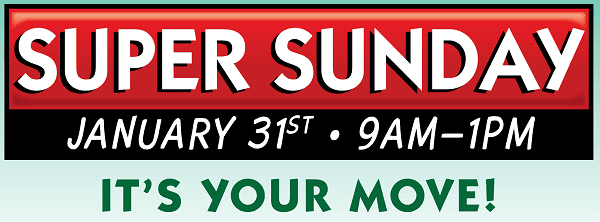Sunday, Jan. 31, 9 am – 1 pm
Developing a theme for Super Sunday, The Tidewater Jewish community’s single largest fundraising event, has been a coming-of-age responsibility for hundreds of young adults since the inaugural event was held in 1981.
This year is no different for the 11 members of the 2016 Super Sunday Steering Committee who are planning and organizing the annual event at the Reba and Sam Sandler Family Campus.
The group of volunteers spent an evening in mid-November cogitating, collaborating, and creating, before agreeing on an idea they thought could resonate with every Jewish person in Tidewater.
Sam Sacks, a third generation Super Sunday volunteer, says the group determined they didn’t want anything cute or kitschy as a theme. Rather, they wanted to inspire volunteers and donors by demonstrating the vast impact that is made when everyone participates.
“We wanted something that was fun, but that showed why Super Sunday is important, and why people should volunteer and donate that day, and that also lets them know about all of the people they help when they support the United Jewish Federation of Tidewater’s Annual Campaign,” says Sacko.
The group settled on a takeoff of the Monopoly game board.
The 2016 Edition Super Sunday game replaces the board’s familiar properties, such as Atlantic Avenue and Park Place, with many of the organizations and agencies that rely on gifts made on Super Sunday and raised through the Annual Campaign, which ends on June 30.
David Brand, a longtime Jewish community activist, volunteer and leader, was a guest speaker at the group’s third meeting in December.
“This is absolutely brilliant,” Brand said as he looked at a sample of the game board, marveling at the “properties” listed, such as Toras Chaim in Portsmouth, Pardes Katz in Israel, Jewish Family Service of Tidewater, and World ORT.
“We never would have thought of this, not in a million years.”
Brand was referring to the young adult community leaders who led Super Sunday at its inception. He was the phone-a-thon’s first chair in 1981, along with Phyllis Katz, working with dozens of other committed volunteers.
Until the Sandler Family Campus opened, the phone-a-thon was held at the “old” JCC on Newport Avenue. Every year (most often on the date of Super Bowl Sunday, thus the event’s name), 40 corded, touch tone phones were brought into the building, plugged in, and used by hundreds of volunteers who called families, friends, neighbors, and other community members, asking for donations to help Jews locally, nationally, in Israel, and around the world.
While the location of Super Sunday and the style of phones may have changed over the years, the involvement of Tidewater’s next generation of Jewish leaders has not. The Young Adult Division of the UJFT, which has a series of leadership training opportunities, is in charge of Super Sunday and takes it’s responsibility—and the day’s success—very seriously.
“The impact that you have, the money that you raise on Super Sunday, helps not only this community, and not only Israeli society, and not only Jewish global society, but the world itself,” Brand said.
Congratulating those at the meeting for the thought that went into creating this year’s theme and for their decision to get involved in a leadership role, Brand said he hoped their involvement would continue.
“You are fortunate to come to a community that wants you, and needs you, and appreciates you. You bring so much more to the community than you know,” he said.
by Laine Mednick Rutherford

